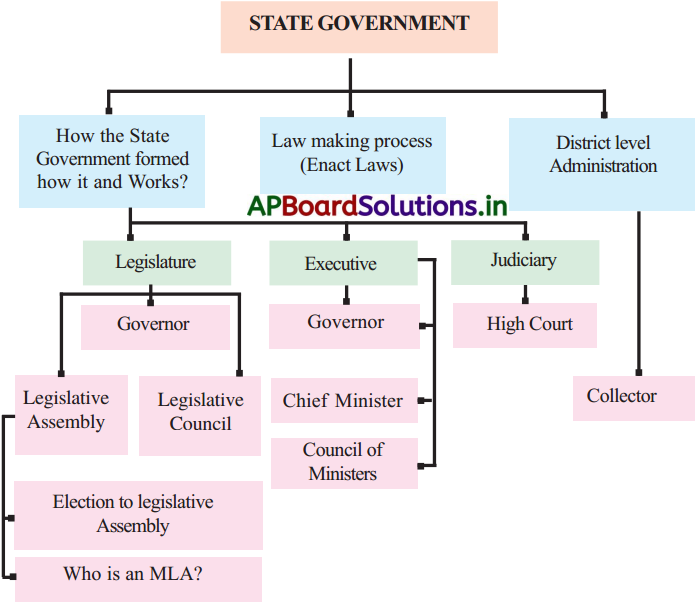Students can go through AP Board 7th Class Social Notes 10th Lesson State Government to understand and remember the concept easily.
AP Board 7th Class Social Notes 10th Lesson State Government
→ In India we have the government at two levels.
→ One is at the centre and the other is at the state.
→ The state government is responsible for the governance of the people of the state.
→ Every state in India have a Governor.
→ The State Legislative Assembly is a legislative body.
→ Generally, elections to the State Legislative Assembly are held once in every five years.
![]()
→ Election Commission deputes mechanism to conduct elections in Assembly Constituencies.
→ After the General Elections, the leader of the majority party or coalition of parties, is invited by the Governor to form the government.
→ The Upper House of the state legislature is called the Legislative Council or Vidhana Parishad.
→ The Governor is the Constitutional head of a state.
→ The Lower House of the state legislature is called the Legislative Assembly or Vidhana Sabha.
→ The Chief Minister is the actual executive authority.
→ Judiciary is one of the three organs of the state government.
→ The High Court is the highest judicial organ at the state level.
→ The District Collector is the head of the district administration.
→ Legislature, Executive and Judiciary are considered as three estates and Media as the fourth estate.
→ Legislature : A legislature is a governing Ipody that makes laws and can also amend or repeal them.
→ Executive : The executive is the branch of government that is responsible for the day-to-day management of the state.
![]()
→ Judiciary : the judicial authorities of a country
→ District level Administration : The management of the tasks of government as it lies within an area legally recognised as a district.
→ Constituency : A particular area from which all the voters living there choose their representatives.
→ Bicameral : Government with two legislative houses.
→ Gazette : An official publication for the purpose of notifying the actions and decisions of the Government.
→ Summons : The process of calling all members of the house.
→ Prorogue : Termination of a session of the house.
→ Bureaucracy : A government that is administered primarily by authorities that are staffed with non-elective officials.
→ Conciliation : An alternative out-of-court dispute resolution instrument like mediation.
![]()
→ Survey Stones : A boundary stone is a robust physical marker that identifies the start of land boundary.
→ Coalition : A group formed with two or more people or political parties for a common purpose.
→ Manifesto : A public declaration of policy and aims, specially issued before an election by a political party.
